
7 minute read
A TRADITION Family
Five Generations of Southeastern Lions
Since the University’s doors first opened in 1925, consecutive generations of one family have formed an unbreakable and moving legacy of attending Southeastern.
BY CALMER DIGHTON
Almost 100 years ago, in 1926, the first class graduated from Southeastern. Since then, over 75,000 people have earned their degree and joined them as Southeastern alumni. For one family, following in these footsteps and attending Southeastern has become a tradition characterized by excellence, dating all the way back to that first graduating class.
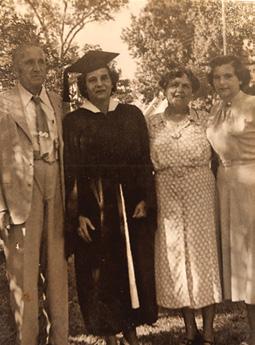
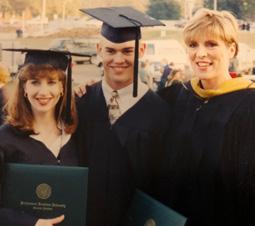
Leigh Henderson, a class of 2021 marketing major currently working on her MBA at Southeastern, is the great-greatgranddaughter of Dorothy Snell Bonicard. Dorothy earned her two-year teaching certificate in 1926 as a member of the first graduating class at what was then called Hammond Junior College. According to Scott Henderson, Leigh's father and a fellow Southeastern alum, “Dorothy was inspired to attend Southeastern to become a teacher while still having the opportunity to be close to her community of Ponchatoula.” Since Dorothy graduated, five generations have attended Southeastern, with 18 family members earning degrees from the University.
So what inspired these generations to continue the legacy of attending Southeastern? Leigh answered, “I am big on tradition. I am also a member of the fifth generation to attend Saint Joseph and Ponchatoula High School. All of my family went to Southeastern, so it only made sense to me to continue that tradition. My parents married while attending Southeastern in their senior year, and it was the first place they lived together in the on-campus married housing. My grandmother, Trudy Bonicard Henderson, attended the University for an education degree. While she never completed her degree, she spoke highly of the faculty, especially the College of Business. That and the ability to stay within my community were a big impact on me choosing Southeastern, but being able to continue building the legacy of attending Southeastern was a big deal to me.”
Trudy Henderson, the granddaughter of Dorothy and grandmother of Leigh, said she was inspired to attend Southeastern by Dorothy. “Grandma Bonicard wanted me to go to Southeastern. She strongly encouraged me, but did not press me to choose a specific major. That was for me to decide. She encouraged me to choose between education, nursing, business education, and accounting.”
Dorothy graduated from Hammond Junior College with the first graduating class. When the requirements for teacher certification changed to a four-year degree, rather than quit teaching and stay at home, Dorothy decided to return to school to meet the new requirements by earning a bachelor’s degree. Scott emphasized the importance of this decision to the family.
“Dorothy returned to Southeastern and earned her four-year certification, all while keeping a family and working. Her return to Southeastern is equally impressive to our family as her being a member of the first graduating class. The fact that she balanced school, family, and a job while completing the fouryear requirements inspired me to attend Southeastern.”
Dorothy had an interesting set of events that ultimately led her to attend Southeastern. Trudy shared, “This is a funny story, she actually attended college in North Louisiana at first, and while there, she decided she wanted to become a pharmacist. When she came home from college, her father (O.C. Snell) read her report card and challenged her on why she was taking classes to become a pharmacist, which he had told her she could not be. He then made her return home, where she attended Southeastern and changed her major to education. As an interesting side note, in 1941, she, my grandfather, my father, and my aunt moved up to Connecticut for one year to work in a munitions factory supporting the war effort. Who knows what would have happened if she had become a pharmacist or even stayed up north in Connecticut, but one thing is for sure, our rich family history at Southeastern may never have been.”
Scott was one of the last Southeastern ROTC cadets to be commissioned before the program took its hiatus in 1995. “As a member of the ROTC program, I was able to compete with the ranger challenge team, a varsity sports team that competed against other schools in the South like LSU and Alabama," he said. "That built a lot of my college experience. I still keep in touch with a handful of friends today who were a part of that program and were commissioned into the Army with me. During my junior year, Dr. Sally Clausen became the University president. The University was going through growth in so many ways, and Dr. Clausen was unique in how she engaged directly with the student leaders. ROTC was not always recognized as a sport, but she recognized it as a sport and brought other student leaders and me to a round table to be heard.”
Scott still connects with Southeastern through the nowreinstated ROTC program. “Since the program started up again, I have been able to attend events like the ROTC alumni dinner. It was nice to be able to meet other legacy officers, as well as the new cadets.”
When asked what being a Southeastern graduate meant to her, Leigh heartfeltly answered. “It means family, and not just my own birth family, but also the family I made at Southeastern. When I started cheering for Southeastern, I made connections quickly. The people I got to know on the cheer team are some of the same people I will probably have standing in my wedding.”
Scott added, “Being a Southeastern graduate means being a deeper member of the community, representing higher education and achievement in this community.”
To Leigh, being a fifth-generation attendee of Southeastern and carrying on the family legacy in such a beneficial, enriching way is particularly meaningful—invoking an inseparable link throughout her own family and the University she loves so dearly.
“Knowing that I have gone through something five generations of my family have gone through is an incredible feeling,” Leigh said. “Southeastern has the same effect on people who attend today as it did back almost 100 years ago.”
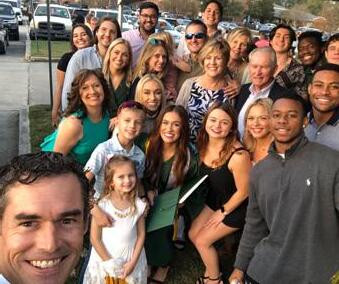
Most people know the name of Southeastern’s mascot is Roomie the Lion; however, not many know how he got his name. Our mascot was named after a farm boy from Monticello, Ms., named Hollis Wilson.
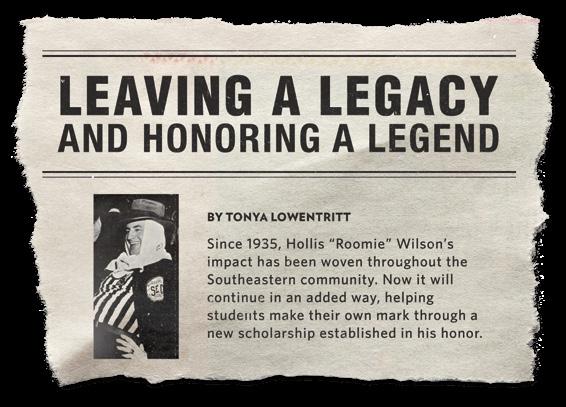
Wilson attended Southwest Mississippi Junior College (SMJC) in Summit, Ms. It was there that he developed a passion for sports. He played football, baseball, basketball and tennis. After graduation, he was named “Athlete of the Year,” and in 1973, he was posthumously inducted into the SMJC Sports Hall of Fame.
To further his college studies, Wilson started at Southeastern Louisiana College (today Southeastern Louisiana University) in 1935. His love of sports allowed him to participate in football, basketball, baseball, and track—and he lettered in all of them. He was a guard on the undefeated 1936 football team and a guard on the basketball team. Wilson was ultimately inducted into Southeastern’s Sports Hall of Fame for Football in 1949 and set a record starting in 39 straight games, becoming known as the “60-minute man.” at Southeastern as a professor of biology with special expertise in botany and entomology.
Working any job he could to help fund his college education, Wilson joined the construction crew to build Strawberry Stadium in 1937, which only took 16 weeks. He and the other football players resided in the first men’s dormitory that was part of the new stadium. His roommate Tommy Womack nicknamed him “Roomie,” and the name stuck.
To honor her father’s legacy for his dedication to Southeastern, academic excellence and love of Lion athletics, Jane Wilson Alldredge recently decided to establish a scholarship in biological sciences, as well as help fund the soon-to-beconstructed new Athletics Building.
“The many years that I have visited the campus and family in Hammond, I have been so impressed with the growth, both at Southeastern and in the Hammond area,” Alldredge said. “I wanted to honor my father’s memory, so I met with both Dan McCarthy, the dean of the College of Science and Technology, and Jay Artigues, the Athletics director, to see how I could make that happen. As a result of those meetings, I established the Hollis “Roomie” Wilson Endowed Scholarship in Biological Sciences and Research and made a donation to the building fund that will allow the players of all sports to have an updated facility with updated equipment.”
Alldredge added that the building fund donation will also result in the coach’s office being named after her father. “Although he was not the coach, my father represents the many players that will enter that office in the future.”
Wilson was hired by Southeastern as superintendent of buildings and grounds after graduation in 1939. That Christmas Eve, he married Erhma Lee Hinson, a fellow student from Hammond. In 1942 he joined the United States Naval Reserves and served in the Pacific Theatre during WWII, stationed in Norfolk, Va., until the war ended in 1945. Wilson, his wife, and new baby daughter Jane then returned to Hammond, where he ultimately worked
Both donations are fitting, as Wilson excelled as a professor at Southeastern, very popular with his students, and as an athlete, athletic official, and super fan.
During remarks made honoring Wilson after his passing in 1964, his former roommate, Womack, remembered him fondly.
“I like to remember him as the student who worked at every job that could assist him in completing his college education, taking outside work, such as a basketball official, night-watchman, and even as an off-hour salesman, determined to complete his college work and prepare himself for better things ahead in life,” he said.
Wilson's dedication and love for Southeastern made him a natural choice for president of the Alumni Association, a position in which he faithfully and capably served. This leadership continued into the world of sports.
“As an athletic official, which began in the 1930s when I, his roommate, saw him learn the rule book—the ‘Bible’ for any official—backward and forward, until his death, he was of immeasurable help to many officials in the field of sports,” Womack explained.

Wilson was in charge of the Tangipahoa Parish High School Officials Association for football and basketball. He assigned officials in the Gulf States Conference and served as president of the Southeastern Conference Officials Association. He also officiated in the NCAA play-offs and at many conference tournaments.
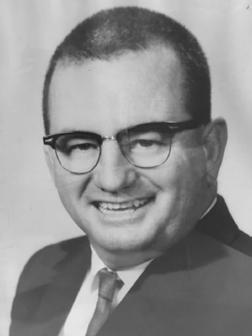
Womack recalled that one of the nicest tributes to Wilson was spoken to him in the privacy of his office by a Hammond attorney, who told him how Roomie Wilson encouraged and helped him as a youth in the city’s recreation program, a program in which he also took a leading part.
“Life was a challenge to Roomie, and he met that challenge head on,” he said.
Wilson’s memory and love of biology and Lion athletics will live on thanks to Alldredge continuing his legacy of giving back to both the University and community he loved.







